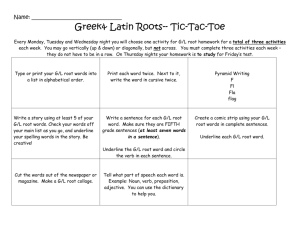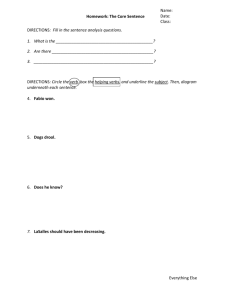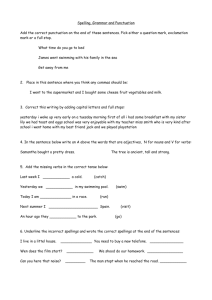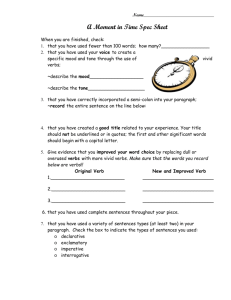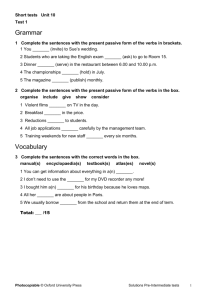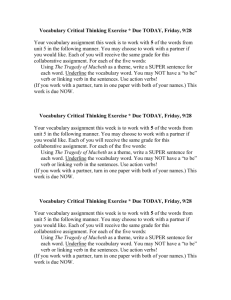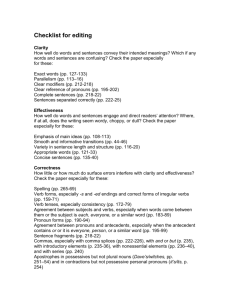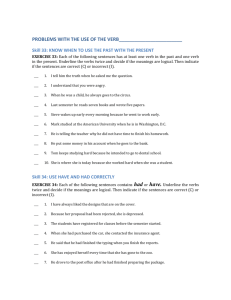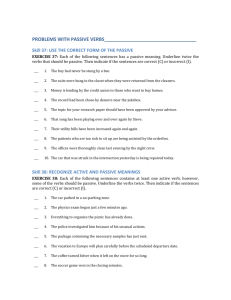Present Perfect Continuous
advertisement
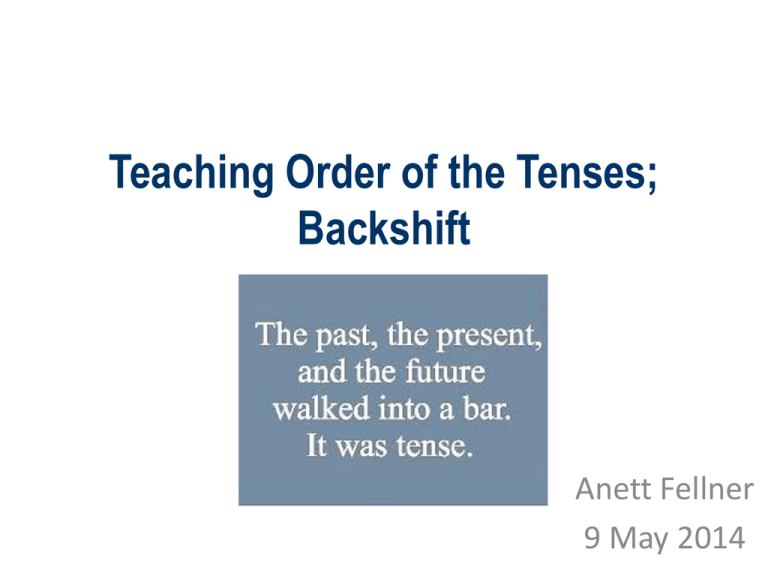
Teaching Order of the Tenses; Backshift Anett Fellner 9 May 2014 Beginner SpeakUp Series New Opportunities Present Simple Present Simple Present Continuous Past Simple (+be going to) Past Simple (+be going to) Elementary Present Perfect Present Perfect Present Continuous Future Simple PreIntermediate Past Continuous Past Continuous Intermediate Present Perfect Continuous Present Perfect Continuous UpperIntermediate Past Perfect Past Perfect Continuous Future Perfect Future Perfect Continuous Past Perfect Past Perfect Continuous Future Perfect Future Perfect Continuous Advanced Future Continuous Future Continuous Future Simple Beginner: Present Simple (Unit 4 ,5 – Life, Routines): + - I You We They like sport _____ live in a house 1. He/She/It + verb + ___ 2. With have: use he/she/it + ______ 3. With verbs ending –ch and –o: use verb + ___ 4A Complete the sentences with a verb in the positive or negative. I live with a friend. (+) I __________ two sisters. (+) I __________ a camera. (-) I __________ English five hours a week. (+) I __________ in an office. (-) Past Simple (Unit 7,8 – Past, Places) 3A Read the article again and find the past form of the verbs below. start started – dance, move, cry, laugh, walk, arrive, stop, talk, listen, wait, play 2A Write the past forms of the verbs. Use the text in exercise 1B to help. Check the meaning of any new words. meet met – come, take, think, become, break, go, have, sit, say Elementary: Present Continuous (Unit 8– Now): I We He ___ ly ___ ___listen___ ___sing____ on the beach. to live jazz. My Way Rules: 1.Use the present simple/present continuous for something we do every day or usually. 2.Use the present simple/present continuous for something we’re doing now or at this moment. Present Perfect (Unit 12– Experiences) 3A Look at the sentence and underline the correct alternative to complete the rule. I’ve been to Guatemala and I’ve climbed that volcano. Rules: 1.Use the present perfect to talk about past events when you know the exact time/don’t know when the event happened. Practice A Have you ever met a famous person? B Yes, I have. I met a famous actor last year. A Really? Who did you meet? Pre-Intermediate: Past Continuous (Unit 5 – Travel) 7A Make sentences with the prompts. I/run/start to snow. So.... I was running when it started to snow. So I went home. 1.I/wait for a bus/meet my boss. 2.I/watch TV/recognise my best friend. Intermediate: Future Simple (Unit 3) Present Perfect Continuous (Unit 7 – Success) 6A Read the sentences below. Underline examples of the present perfect simple and present perfect continuous. Rules: 1.Use the present perfect continuous to emphasize that an action has been long and repeated. 2.With state verbs (e.g. like, love, understand, remember, know, etc.) we cannot use the present perfect continuous. 3. We often use for/since and How long have you...? with the present perfect and the present perfect continues. Upper-Intermediate: Past Perfect and Past Perfect Continuous (Unit 4– Stories): 3A Read the first paragraph of Starfish again and underline examples of the past simple; the past continuous; the past perfect and the past perfect continuous. Future Perfect and Future Perfect Continues (Unit 6 – Age) 4A Look at the sentences from Laura’s letter. Which one talks about. •things that will be completed before she opens the letter? •things that will be in progress around the time that she opens the letter? a, I’ll have changed a lot. b, I bet when I get this, it’ll be raining Rules: 1.To talk about something that will finish before a specific time in the future, use will + ___ +___. 2.To talk about something that will be in progress at or around a specific time in the future, use will + ___ + ___. Backshift: Practice 7 Put the paragraph below into reported speech. Begin each sentence with He told me or He said. Pre-Intermediate I’m an actor. I can play any role, but I don’t like playing criminals. I’m moving to Hollywood and I am going to be a big star. I’ll stay in touch.’ ‘ 6 Compare the words spoken to the reported sentences and answer questions 1-2 below. direct speech ‘I’s my last film’.’ ‘Sign language is speaking.’ ‘They don’t have speaking roles.’ ‘They are badly treated.’ reported speech He told everyone it was his last film. They told the union that sign language was speaking. The studio said they didn’t have speaking roles.’ He said that workers were badly treated.
